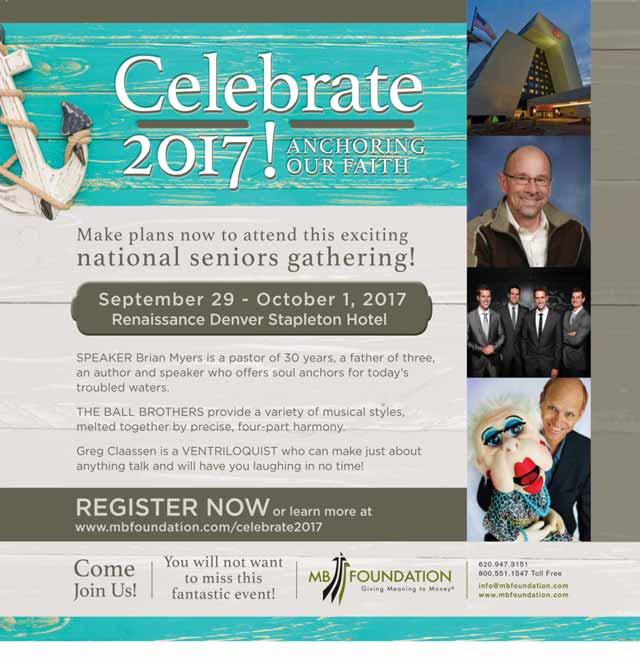HRISTIAN EADER

Is your church a safe place?Page 12 FaithFront equips studentsPage 21 The power of being unitedPage 31
May / June 2017









Is your church a safe place?Page 12 FaithFront equips studentsPage 21 The power of being unitedPage 31
May / June 2017







In the summer of 2016, U.S. Mennonite Brethren affirmed a new ministry vision and strategy that emphasizes three core commitments:
• local, national and global church multiplication/church planting/evangelism,
• intentional disciple-making and
• developing leaders.
The document that outlines this new ministry approach, The U.S. Mennonite Brethren Movement: The Future Story (http://www.usmb.org/departments/Futurestory.html) describes what progress will be made from 2015 to 2025 in achieving the strategy’s goals and vision.
Here is how the document summarizes where we will be by 2025 in terms of leadership development: “Each year, significant progress was made in the calling out and development of emerging, diverse leaders. Significant increase in the effectiveness of existing leaders was also occurring through intentional leadership development. Peer learning clusters of pastors, staff and various ministry personnel infused best practices into many ministry settings.”
The document describes what will characterize our family of churches by 2025—but offers few details for how we will get from where we are now in terms of calling out and equipping a new generation of leaders to where we hope to be in 2025. Charting a course that fills in these details—not only with regard to developing leaders but also in the areas of intentional disciple-making and church multiplication and evangelism—is one of the tasks before us.
I hope the Christian Leader will assist in fleshing out this new shared vision by providing encouragement and insights and by sharing examples of how we are working toward these goals. For example, several pieces in this issue of Christian Leader focus on leadership development, including a feature article by Chandelle Claassen that invites us to discerne times when we can serve best by leading and those times when we do best to follow. In BodyLife you will learn how two USMB district are drawing on the resources offered by The Urban Ministry Institute (TUMI) to provide pastoral training and about a new and improved leadership program targeting high school students.
Speaker and business leader Les Brown has said, “Your goals are the road maps that guide you and show you what is possible for your life.” In many ways, we’re more like explorers than tourists. We don’t have a detailed road map telling us exactly what to do, but we have the adventure of discovering what’s possible. I invite individuals, pastors and congregations to join this expedition. Embrace this vision for our family of churches. The end result of this 10year journey will be incomplete without the support of each USMB congregation. ◗

Faber has served as editor of Christian Leader since 2004. She and her husband, David, are members of Ebenfeld MB Church, Hillsboro, Kan.
Vol. 80, No. 3 May / June 2017
The Christian Leader (ISSN 0009-5149) is a gathering place for the people, passions and mission of U.S Mennonite Brethren. The Christian Leader is published bimonthly by the U.S. Conference of Mennonite Brethren Churches. However, the opinions expressed here are not necessarily those of the church as a whole.
COPYRIGHT: The articles printed in the Christian Leader are owned by the CL or by the author and may not be reprinted without permission. Unless noted, Scripture quotations are from the New International Version.
READER PARTICIPATION: Letters to the editor should be 300 words or less and on one subject. Letters must be signed and include the writer’s city and state. Letters will be edited for clarity, appropriateness and length. Letters will be published, as space allows, unless marked, “Not for publication.”
Freelance article submissions are welcome; a SASE must accompany articles.
SUBSCRIPTIONS: $10 for six issues and $20 for 12 issues ($15, $30 in Canada; all other countries $25 for six issues); $1.50 per copy
CORRESPONDENCE: All correspondence, including subscription questions and address updates, should be addressed to Christian Leader Box 155, 107 N. Main Hillsboro, KS 67063-0155 Phone: 620.947.5543 Email: editor@usmb.org
MEMBERSHIP: The Christian Leader is a member of the Evangelical Press Association and Meetinghouse, an association of Mennonite and Brethren in Christ editors.
POSTMASTER: Send address changes to Christian Leader, Box 155, Hillsboro, KS 67063. Periodicals postage paid at Hillsboro, Kansas.

U.S. Conference of Mennonite
“Thailand 2017: The Church on Mission,” a historic gathering called
received at least half a dozen requests to join.
Gary Wall, Pacific District Conference minister; Tim Sullivan, Southern District Conference minister; Lianne Nikkel, Leadership Board member; and Jana Hildebrandt, pastoral staff
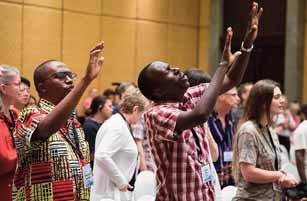
by the International Community of Mennonite Brethren (ICOMB), brought together 240 delegates from 36 countries to talk and pray about mission. The gathering, also sponsored by MB Mission, was held March 7-12 at The Tide Resort in Chon Buri, Thailand.
Leaders came from well-established Mennonite Brethren conferences and new associations under MB Mission. In most cases, conferences sent their principal leader plus a mission or church planting coordinator. The theme of a mission and gospel that is “everywhere to everywhere” was explored in plenary sessions, Bible studies and workshops, while the parallel theme of prayer complemented everything in practice, example and teaching. Participants also sang, discussed and heard reports and enjoyed Thai food and culture.
Participants made many new contacts; most of the emerging network leaders had never met such a large body of the MB family. The sense of belonging was palpable, and ICOMB
member at First MB Church in Wichita, Kan. and a member of the USMB Board of Faith and Life, represented USMB. Ed Boschman, the USMB representative to ICOMB, also attended the consultation as well as the annual ICOMB Summit that followed. Conference representatives to the 2017 summit commissioned Rudi Plett as the new part-time ICOMB associate director and discussed education needs among member conferences. —ICOMB
The 2017 National Pastors’ Orientation (NPO), held March 27-29 in San Diego, Calif., provided 15 new U.S. Mennonite Brethren pastoral staff members with information about MB history, theology and USMB structure, ministries and ministry partners. The three-day orientation also highlighted the new USMB ministry strategy that emphasize church planting and evangelism, intentional disciple-
making and leadership development as well as networking.
A total of 49 people, including presenters, ministry representatives and spouses, attended the NPO, hosted by the USMB Board of Faith and Life (BFL). There were numerous opportunities for pastors to connect and network with one another and ministry representatives during table discussions, question and answer times and informally during meals, breaks and free time.—CL
MB Foundation will host a second event focused on empty nesters, builders and boomers Sept. 29–Oct. 1 in Denver, Colo. Celebrate 2017 will be held at the newly remodeled Renaissance Denver Stapleton Hotel and will feature great music, encouragement and fellowship.
The theme for Celebrate 2017 is “Anchoring our Faith.” Knowing how fast things are changing in our society, a gathering like this can help attendees navigate the landscape and stay anchored to the one constant, our faith. “We are privileged to serve this generation and eagerly anticipate this second gathering,” says Jon C. Wiebe, president and CEO of MB Foundation.
Back by popular demand, The Ball Brothers will kick off Celebrate 2017 Friday evening with musical entertainment. Author and speaker Brian Myers will help unpack the theme. The fun will continue with ventriloquist Greg Claassen on Saturday night.
MB Foundation previously hosted Celebrate 2015, “This Is My Story,” Oct. 2-4, 2015, in Overland Park, Kan. MB Foundation is honored to continue to serve this generation and host Celebrate 2017. For more information, visit www.mbfoundation.com/celebrate2017 or contact MB Foundation at 800-551-1547. MBF
The Latin America MB Conference (LAMB), a district conference of 11 congregations in South Texas, celebrated new ministry opportunities during its annual gatherings. Delegates to the annual business session
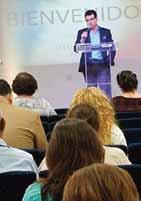
held Jan. 21 at Palmview Church approved the 2017 budget, and each church gave its support and affirmation to adopt The Urban Ministry Institute (TUMI) program as their resource for leadership development in the district.
TUMI is the national training arm of World Impact, a Christian mission organization committed to facilitating church planting movements by evangelizing, equipping and empowering America’s unchurched urban poor. Mission MB Church is hosting the first TUMI satellite among the USMB churches in South Texas, and Moises Tagle, LAMB Conference moderator, is leading the program.
News of the TUMI program was shared with attendees at the LAMB district worship service held four weeks later. The district-wide worship service Feb. 17 was hosted by Grace Point @ Grulla in La Grulla. The theme of the worship service was “Edify,” taken from Ephesians 4:15-16. The speaker was Pastor Josue Contreras from La Joya MB Church. —CL
Jim Enns, Pacific District Conference (PDC) treasurer and chief financial officer, will retire following the October 2017 district convention, announced the PDC in early February. At the time of his retirement, Enns will have completed an unprecedented 34 years as district treasurer. District leaders are exploring options for future staffing following Enns’ retirement in order to meet the district’s financial and property management oversight needs. —PDC
The Canadian Conference of MB Churches (CCMBC) Executive Board has approved a motion regarding the relationship in Canada between MB Mission, the North American Mennonite Brethren mission agency, and C2C Network, the church planting ministry of CCMBC.
A task force, formed in July 2016, has been exploring options for C2C and MB Mission to work together to plant churches locally, nationally and globally. U.S. Mennonite Brethren are represented on the task force by Don Morris, USMB national director, and Gary Wall, Pacific District Conference district minister. The task force gave a report to the CCMBC executive during their January meeting, and the board unanimously approved a motion “that MB Mission assume responsibility for the mission and ministry of C2C Network.” Because C2C in Canada is a ministry owned by CCMBC, the motion will be processed further with MB Mission and CCMBC delegates before becoming final.
A Memorandum of Understanding between USMB, MB Mission and C2C adopted in January 2017 clarifies the working relationship between these entities for MB church planting in the U.S. According to the MOU, a
C2C National Leadership Team, which includes Morris, provides oversight for C2C in the U.S. as the network begins working in the U.S., all under the organizational structure and mission of MB Mission. —CCMBC
Attendees of the Multiply conference, held Feb. 22-23 at Mountain View Community Church, Fresno, Calif., dubbed the event a success. The goal of Multiply was to embolden church leaders to follow the Spirit’s leading to multiply disciples through the church—locally, nationally and globally. The event was sponsored by MB Mission, the North American mission agency, and C2C Network, a church planting network authorized to partner in Mennonite Brethren church planting in the U.S.
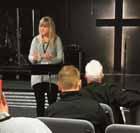
Organizers compare the conference to a two-day church service, with lively worship and a lot of prayer. Plenary sessions and 16 workshops in four tracks were received with enthusiasm. A four-part workshop by pastor and author Jeff Venderstelt on “Multiplying Disciples through Missional Communities” was packed every session. According to Scott Thomas, C2C National Director for the U.S., Multiply was important for the USMB national family because it rallied church leaders around common verbiage of gospel, mission and Spirit empowerment. Next year’s Multiply conference will be held Feb. 21-22, 2018, at Copper Hills Church, Phoenix, Ariz. C2C
Tabor College, the Mennonite Brethren college in Hillsboro, Kan., is the first higher educational institution to form a fraternal relationship with Evana Network, opening doors for collaboration among the Anabaptist community. Evana Network, whose name comes from the words evangelical and Anabaptist, includes 30 churches, mostly in the U.S. Midwest and Northeast, and works with institutions to provide collaboration and open discussion across the membership. —TC
The ALAS Lecture Series is a new opportunity offered by Fresno Pacific University, the Mennonite Brethren school headquartered in Fresno, Calif., intended to help the public and the university community develop tools to succeed in a diverse world. The 2017 series, running January through April, was comprised of six public events and a series of related student activities on subjects such as education, history and art. Funding came from a five-year, $2.36 million U.S. Department of Education grant that the university received in 2015 to encourage Hispanic and low-income students to enroll in and graduate from FPU. ALAS, Spanish for “wings,” stands for Advancing Latino Academic Success. —FPU
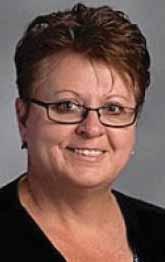

What do you like about preschool?
I am the first point of contact families have with the public school. A baby might be born with Down syndrome, for example, and I’m right in there with them from the start. I can be with them for up to five years, helping them with a plan for their child’s development.
What do children need the most from their teachers?
They need the Jesus message. Jesus doesn’t ask us to clean up our act before he will love us. All the academic and developmental stuff is important, but kids need to know we love them—no matter how they behave, we will still accept and care for them. I love children, and I love the way God loves them.
What do their parents need?
Parents need to know they are critical in the lives of their children. One of the most heart-wrenching
It was Friday afternoon—time to unwind after another intense week working with preschoolers, some with special needs, and their parents at Heartland Community School in Henderson, Neb. But Dot Quiring, from Henderson MB Church, took a few minutes to share her view from 29 years as Heartland’s early interventionist. Quiring was recently honored as Ambassador Educator of the Year by the York County Chamber of Commerce.
parts of my job is when I can’t just be Miss Dot, the teacher, but I have to be Mama Dot for a few little ones who have a difficult situation at home.
How does your church partner with you?
I take some kids to church with me. We feed them on Wednesday nights, which is crucial for our lower income families. This year I started a women’s Bible study and got moms of these kids involved too.
Anabaptists from around the world gathered Feb. 12 in Augsburg, Germany for “Transformed by the Word: Reading Scripture in Anabaptist Perspectives,” the first in a series of “Renewal 2027” events organized by Mennonite World Conference. Renewal 2027 is a 10-year series of events commemorating the 500th anniversary of the Anabaptist-Mennonite tradition. The 2017 gathering—500 years after Luther’s famous appeal to sola scriptura—explored how Anabaptists have engaged the Bible in the past and how it continues to be relevant today. Valerie Rempel, professor at Fresno Pacific Biblical Seminary in Fresno, Calif., was among the speakers. MWC is a global fellowship of Anabaptist-related churches. MWC InterviewbyKathyHeinrichsWiest
Is that risky as a public school teacher?
God knows the limitations I have on the job so he opens the door— maybe at the grocery store or when I’m out for a walk with my dog. And even at school when I’m sitting and rocking a child trying to calm him down I’m saying a prayer for him. Nobody can stop a teacher from praying for her students and their families.

Imet Christian in the fall of 2012 when he was 21 years old. He heard about our church from some boys in his apartment complex. Christian had moved from Upland, Calif., to Fresno, Calif., with his family at the age of 10 and had lived in various motels on “motel drive.” The local apartment nearby our church was his first “home” after almost seven years of living in motels.
Christian’s father was in and out of their home, and Christian was in and out of juvenile hall for most of his teenage years. It was there he started turning back to God. At 21, he was coming of age and searching for something more. Christian slowly got connected, grew in his faith with Jesus and was baptized in spring of 2013. Christian’s intentional process of discipleship had begun.
When Jesus made disciples, he called them to follow him and he spent time with them eating, traveling, talking and modeling life and almost all facets of his ministry. It seems to me that for Jesus, intentional disciple-making was relational, centered on mentoring and was hands-on and practical. I believe that Jesus is not just the central message of our ministry but also the primary model for our ministry. This could not be truer than with intentional disciple-making.
Christian was part of our very first year of the Micah Project, a 10-month discipleship experience where participants live in community, engage in intensive discipleship material and experiences and serve in urban ministry. It is one of the most deliberate and powerful ways I have seen disciple-making in action at North Fresno Church. It grew out of a vision and desire to be more intentional in this area.
We saw a lot of potential in Christian, and he had a strong desire to grow. But discipleship can’t be relegated to a program, and that is why one of the most important elements of the Micah Project is relational and centered on mentoring. Each Micah Project intern is partnered with a mentor. These mentors meet with them every two weeks during the program and continue for six months after-
ward as they transition into what God has for them next.
Wes was assigned to be Christian’s mentor, and the way Christian describes it, became the grandfather he never had. Wes and others in the church enlarged Christian’s experience of family and provided solid support on his personal and spiritual journey. Christian cites Matthew 12:48-50 to describe his experience with Wes and his new church family: “‘Who is my mother, and who are my brothers?’
Pointing to his disciples, [Jesus] said, ‘Here are my mother and my brothers. For whoever does the will of my Father in heaven is my brother and sister and mother.’”
Christian began to serve and get involved in ministry. He led sports and games at our Wednesday evening children’s ministries. The kids loved him. Christian influenced many who lived in his complex and in our neighborhood and grew in his leadership skills. Christian finished the Micah Project three years ago and has continued to grow in every area of his life. He is currently a student at Fresno State University, training to work in the nonprofit and urban development field. He and Cathryn, another Micah Project graduate from the year after Christian, just celebrated their first wedding anniversary and welcomed their son, Seth, in January.
One of Christian’s earliest prayers was that he wanted to do something amazing with his life. God’s desire is to always answer that prayer and create something amazing out of our lives as we become more like Christ. Christian’s passion, dedication and transformation inspire me on my journey with Jesus. How am I processing my call to ministry? Who am I spending time with, and do I have a mentor drawing me into a deeper relationship with Christ? Am I involved in handson, practical ministry as an intentional part of my spiritual growth?
May we as Mennonite Brethren churches keep intentional disciple-making at the center of our mission, and may amazing stories continue to emerge from among us as we see personal and community transformation.◗

James Bergen is pastor of North Fresno Church in Fresno, Calif. Bergen, a graduate of Fresno Pacific Biblical Seminary, is passionate about God’s mission and neighborhood transformation. He and his wife, Marcy, have three children.
Ihave no nationality. I am just of Jesus Christ.
My name is Safari, and I have been a refugee for more than 20 years—because God wanted me to be.
My tribe, the Tutsi, is not accepted in Congo. Many have been killed, including my family. When they killed my father, I was in my bed. I saw how they killed him, I knew who killed him and I thought I would be dead as well. By the grace of God, I survived. I fled to a refugee camp in Rwanda. After a time, I returned to Congo, but I was persecuted, so I went to Burundi. I went back to Congo but had to escape again. This was in 2007. When I arrived (at the refugee camp) in Malawi, God called me to serve him. The camp is a small place with 27,000 people all crammed together. People die every day because of conflict.
But in my time in Congo, the Mennonite Brethren church taught me about forgiveness, that God lives in peace and that I need to love others in the same way God has loved me. So I prayed and began to share the good news.
Starting with four people who received the message, we moved around in the camp preaching the good news. How you can be forgiven. How you can live together in peace. God gave me grace to be listened to. We began to call ourselves “the Menno Group” because we speak about peace, repentance and love.
One day there was news that a rebel had come to the camp. Many people
knew what he had done in Congo, and they ran and hid. I found the man all alone. I started to tremble. Here was the man in charge of the operation that killed my parents.
“My brother, how are you?” I said. “Do you remember me? I’m the son of the pastor. It’s you who killed my father.
“But, my brother,” I told him, “you are good. It’s not you that killed; it’s the thing that’s inside of you that is bad. Come to my house,” I invited. “It’s your time to receive Christ.” He accepted. For three years, he was in my house. Now he’s one of the pastors in our church.
Because of this testimony, the message of peace is now grounded–people see it has teeth. God is using us, the church is continuing and people are accepting Jesus Christ. In 2008, we got official government recognition as an MB church.
I have been teaching others by the grace of God. We now have 15 churches with more than 2,500 people. We do literacy work with women and Bible training to form servants of God. In the camp, people know this is a church that brings peace. I thank the Father that because of war people are accepting Jesus.
I have had opportunities to go to the West as a refugee, but I refused because my mission in Malawi is not finished. If these 27,000 people in the camp are transformed, they will transform the world. God uses people who were not accepted to do his work. May all glory be to God.◗

Safari Mutebesha, a church leader living in Malawi, shared his testimony March 13 at the International Community of Mennonite Brethren “Church in Mission” consultation in Thailand. This essay was adapted by Karla Braun, editor of the MB Herald, from a recording.
By Chandelle Claassen


“Mom, I like watching people and seeing who the generals are and who the soldiers are,” my eldest said one evening when he was around 10 years old. I asked what he meant, and he elaborated on his thoughts on leaders and followers. I was curious how he saw himself.”
“Sometimes I’m a general and sometimes I’m a soldier, he said. “I know when to lead and I know when to follow.”
As a lifetime follower, I was profoundly impacted. And thus began a significant shift in my life.
Goose-style leadership
I had lived my life as a confident follower, believing in myself as a valuable asset to any leader needing someone to help work toward their vision. I also assumed that I was not capable of gaining the allegiance of my own followers. Being an introvert didn’t help my cause.
Over time, my love of people, being aware of my gifting and my ministry experience seemed to come together. I went back to school, was trained as a professional life coach and sought further training in spiritual direction. During the coaching classes with The Christian Coach Institute, I started wrestling with my false narrative about not being able to lead. One of our textbooks, Christian Coaching by Gary Collins, offered leadership illustrations that impacted me and addressed the shifts in our culture in how leadership is viewed. These illustrations were on the leadership styles of buffalo and those of geese.
Buffalo are loyal to one leader—the head of the herd. They follow where the leader goes and wait for his direction. For many years, we taught and followed that buffalo leadership style: Faithful followers rally behind one leader who casts all the vision and has all the power. I’m a product from one of the generations of buffalo leadership. Many of us are.
In contrast, geese reflect the shifts in our cultural approach to leadership. In flight, geese frequently change their leader at the front or point of their V formation. Leaders following the geese model equip and encourage everyone in the capacity to have a role in leadership. Change and creativity are welcomed. Teaching responsibility, ownership and character development are key. I believe my son has already grasped the concept of geese leadership. As Collins says, “Modern leadership is goose-style leadership.”
Collins continues: “Leadership is about building teams, encouraging innovation, thinking strategically, removing obstacles, creating vision and taking risks. Leadership has little to do with one’s title or position. It has everything to do with being trustworthy, supportive, sensitive, aware of trends, willing to try new things—and even cheering when your protégés and followers soar past you to leadership positions of their own.”
As we look at cultural shifts in leadership, I’ve heard some people say that if you’re over a certain age, it’s your responsibility to hand over the baton of leadership to the younger generation. While that sentiment begins to address calling out and equipping younger leaders, it doesn’t go far enough in building teams of leaders.
I am convinced that goose-style leadership lasts a lifetime. It’s a team effort. Leaders aren’t put out to pasture because of age and an expiration mark, and youth aren’t discredited for their age and lack of experience. God is bigger than either of these boxes, and he calls and invites a variety of individuals to cast vision for his kingdom and his glory.
I was inspired by Collins’ thoughts on buffalo and geese leadership and utilizing a professional life coach has helped my own de-


velopment as a leader. My work with Amanda was pivotal. She asked me powerful questions and helped me identify areas in my life where I had in fact been leading.
One fruitful exercise I did was to ask several people to share areas of leadership they saw me having. Unaware of my internal struggles, everyone shared openly. I was greatly helped by the voices of others speaking life into me. I could confidently climb out of the false narrative that I was only a follower. I could embrace existing leadership roles with more boldness and step up in other areas. I found a road that connected my vision and my passions with fulfilling work.
Now I enthusiastically lead through my work as a life coach and spiritual director. I champion others in finding their authentic self, their confidence and voice and their own areas of leadership. In this work, we find ourselves dusting for the fingerprints of God and his involvement in our lives as we respond to the invitations and gifts he gives to us.
Understanding our gifts
James 1:17 says, “Every good and perfect gift is from above, coming down from the Father of the heavenly lights, who does not change like shifting shadows.”
This ministry of identifying gifts is based on three words: identity, intimacy and impact. Identity is knowing who we are in our truest self as God created. We grow when we are confidently intimate in our relationship with God and others. And this allows us to enrich the impact we have in our spheres of influence. When we understand our gifts, we are able to better identify when to lead and when to follow.
Regardless of age, gender, profession and season of life, we as God’s children always have an invitation to be attentive to God’s

work in our lives. A good place to begin is by asking ourselves some questions: How has God uniquely created and called me to lead? What impact does my life have on those around me? Who’s in my V formation and how do we take turns and develop one another?
As you contemplate these leadership questions, having a soul companion in the form of a life coach or spiritual director can be a valuable resource. Ultimately, leadership is all about relationship. A coach helps move you forward, helping to bridge the gap from where you are to where you want to go. A spiritual director offers a listening ministry, encouraging a deeper awareness as you sit with God and intentionally savor his Word and his work in your life.
Leadership development is a lifelong endeavor. Its significance ripples across the generations and produces transformation. Jesus equipped his disciples with leadership tools and responsibilities, and their lives and ministry were transformed. Like with the disciples, Jesus continues to equip and encourage us with the tools and responsibility of leadership in our homes, communities and churches. Jesus is alongside us in our V formations.
Chandelle Claassen is a certified professional life coach and a member of the USMB LEAD Coaching team. She is also a trained spiritual director through The Schools of Sustainable Faith. She lives in North Newton, Kan., with her husband, Russ, who is the youth pastor at Koerner Heights Church and also the Southern District Conference youth minister. They have two boys and enjoy being an active family in their community.
In the fall of 2017, Claassen will be working alongside trainers Marty and Sandy Boller to bring a Schools of Sustainable Faith spiritual direction training cohort to Wichita, Kan. This certificate program offers one and two year certificates in spiritual direction. Please visit bluestemlifecoaching.com for more information.◗





By Anna Groff
For many of us, church feels good and safe. We were loved there as children and are respected there as adults. In fact, we often describe our congregations as families or caring communities where all are accepted. We trust one another, and we feel confident that others want the best for us and our families.
But for some of us, church was not only unsafe, it was destructive. Abuse by a church leader or an adult in the church community impacts us forever and can drastically change how a victim/survivor understands God. We know one in six boys will experience some form of sexual abuse and one in four girls (Center for Disease Control). While this abuse hasn’t necessarily occurred in church settings, we can consider how much of our lives and our children’s lives are connected to church and church institutions like schools, camps and more. No church or denomination is immune to an abuse crisis. It isn’t a “conservative church” or a “liberal church” problem. And if we’re not a part of the solution, we may be part of the problem.
The clear majority of victims/survivors know their offender as a family member or friend of the family. This gives new meaning to the “we’re like family” description. We don’t need to start distrusting everyone, but we should acknowledge that the higher the trust, the higher the risk that an offender may exploit our trust. “Stranger danger” is a myth that misleads and distracts.
Without diminishing the gifts that church offers for people of all ages, it is important to create healthy boundaries so that churches can remain safe spaces for everyone—especially children. Fortunately, we can prevent abuse and learn how to respond well after a crisis. Your church can act now to keep kids safe tomorrow.
1. Create and implement a policy
A child protection policy communicates to everyone that children are valued by your church, and it serves as a reminder that adults are responsible for keeping children safe. Avoid working on this alone. Instead, share the load with a safe church committee made up of men
and women—and perhaps a known survivor who is open to participating. Remember victims/survivors do exist in your church and can help lead the way in creating a culture of safety.
In your policy, consider facility safety, supervision of children and the two-adult rule, screening and background checks for volunteers, social media/communication guidelines, transportation challenges and the risks and benefits of mentoring programs.
2. Offer regular training for adults and children
While we can teach and empower children to say no or to talk to their parents when they feel unsafe, we can’t expect them to prevent grooming and abuse on their own. This is up to the adults, and many adults need information and training to enable them to aid in these efforts. Ideally, your policy would require annual trainings for volunteers and staff working with children, but including all adults has many benefits.
Bringing in local resource people from your community for these trainings helps build awareness and partnerships. While sexual abuse is the most common form of abuse in church settings, teach about the other types of abuse—physical, emotional and neglect.
Consider using Circle of Grace, a Christian safe environment curriculum, with pre-K to 12th grade. Remember that some adolescents also commit sexual violence against their peers or younger children. Remember that Christian education plays a key role in creating a culture of safety. Also, be wary of using youth to care for children unsupervised.
3. Talk about boundaries and appropriate touch
Part of the work of a safe church committee is to create an atmosphere where all bodies are respected. Allow children to initiate affection, and teach adults that affectionate touch is best when observable and interruptible. Adults should feel free to decline hugs or other kinds of touch. If a youth says he or she feels uncomfortable with someone, take him or her seriously. Whether a touch is good, bad or confusing is determined by the receiver’s experience of the touch, not by the intentions of the person doing the touching.
If a child/youth discloses abuse to you or you suspect abuse, believe the child/youth and make a report immediately to Child Protective Services or the police. Remember: You don’t have to have evidence or proof. Do not do the investigation yourself—or anything that resembles that. Cooperate with professionals who conduct the investigation.
■ After reporting, notify the pastor and/or child protection team.
■ Immediately attend to the victim and his or her family’s safety and needs through church leadership and an outside agency, like a child advocacy center. Keep the victim’s needs at the center of any process.
■ Immediately relieve the alleged offender from all responsibilities involving contact with children until the conclusion of the investigation.
■ Consider the likelihood that there is more than one individual harmed.
■ Within 48 hours, notify all parents whose children may have encountered the alleged offender. Let them know that allegations have been made and reported.
■ Keep victims and offenders separated during the investigation. Support child victims in engaging in age-appropriate activities. If offenders are adolescents, find alternate activities for them.
■ Inform district conference leadership.
■ After the investigation, follow all legal implications for the offender. Inform the entire church. Secrecy not only makes children unsafe, it also does not help offenders.
■ Even if the abuse is not confirmed, attend to the dynamics that prompted the allegations and carefully consider the degree to which victims and offenders need to remain separated.
■ Make pastoral care available to all involved. It is important to prioritize the needs of the victim over the offender.
■ Communities themselves need healing from crisis. This can happen through informational meetings with time for questions and answers, circle gatherings to hear harms and feelings and formulation of a task force to do problem-solving for the future.—AG
See dovesnest.net for materials, resources, blogs and recommended organizations related to safe church practices. Additional resources are also posted online at www.usmb.org/CLFeatures
The pulpit and Sunday school classes offer valuable places for abuse to be named and to lift up children. Finally, remember that adult victims/survivors may be triggered when discussing abuse and prevention; if possible, offer support to victims/survivors on an ongoing basis.
4. Be prepared for pushback
Keeping children safe seems like something that everyone would easily agree about, but don’t be surprised when people question some parts of the policy or the renewed emphasis on safety. Unfortunately, many of us doubt stories of abuse or find ourselves skeptical of victims/survivors. So be prepared for pushback. Address cynicism directly and with care.
“Policies and background checks are too much work.” Remind people at your church of Jesus’s command and our commitment to the well-being of the vulnerable. In Luke 18:16, Jesus says, “Let the children come.” In Matthew 18:6, Jesus also directs harsh words at those who harm them. In our desire for forgiveness and to love our enemies (or offenders), we may overlook that our priority is to protect the innocent.
Abuse shatters individuals, families and communities. The trauma of child abuse can lead to long-term emotional pain, addiction and suicide in adult victims/survivors. It can even affect physical health.
Take two middle-aged men who are both nonsmokers, moderate drinkers, not obese and reasonably fit. “If the only difference between them was that one had suffered physical or sexual abuse as a child, that man would be 45 percent more likely than his peer to contract cancer,” writes John Barber in his article, “The Hidden Epidemic” published in the autumn 2016 issue of University of Toronto Magazine. Also, research shows that victims of child sexual abuse are far more likely to be obese as adults.
“We don’t have many children at our church.” Fewer children often means less robust safety plans, so children could be at more risk. Young families will find church protection policies and practices appealing. Also, prepare for growth. For example, several refugee families started regularly attending one church, and each family had four or five children. The nursery went from two or three children each Sunday to a roomful. A protection policy already in place helps provides for these unforeseen blessings.
“But we don’t want to scare people away from interacting with children.” The first thing is to educate adults in your trainings about what grooming is and is not. Grooming is not general friendliness to children. Grooming is finding ways to be alone with a child or showing one child special attention with the intention to take advantage of their trust and sexually harm them. For example, showing up at a child’s piano lesson regularly or insisting on being physical with a child could be grooming behavior.
Encourage adults to talk to children and youth. Many youth want to be heard and to have genuine conversations with adults at their church. Affection and kindness can safely happen in public and be interruptible—and still be meaningful to children and youth.
Anna Groff is executive director of Dove’s Nest, headquartered in Omaha, Neb. Dove’s Nest’s mission is to empower and equip faith communities to keep children and youth safe in their homes, churches, and communities. This article was commissioned by Meetinghouse, an association of Mennonite periodicals.◗

Come with me on a road trip. Travel our constituency from North Carolina to California, Montana to Texas. See the land God created. Marvel at the evidence of his goodness and grace. Hear the stories of how God has blessed ingenuity and hard work, often symbolized through the ownership of real estate. Observe the struggle and responsibility as each person decides how best to honor God with their wealth.
What are the tales you hear from the road? You hear of one couple who puts all of their farmland in a dynasty trust and chooses not to make a charitable gift at death. You hear from another couple who is donating their last acreage into a chari-
By Jon C. Wiebe
table remainder trust, consciously making a decision to limit what the children receive through inheritance in favor of reorganizing resources to maximize funds for ministry. You have the privilege of hearing from a set of siblings who encouraged their father to place his family farm into a charitable remainder trust, receiving income for life and then establishing an endowment in honor of him and their mother at his death.
Next stop might be the couple who once said they just can’t bring themselves to part with any of the land, but when they die, their children can do whatever they want. Since making that statement, things have changed, and they’ve liquidated some property to benefit family and ministry while living.



Is farmland a blessing or curse?
As we travel around our constituency, we hear a common theme from farmland owners. There is a deep-rooted, heart-felt desire to not sell farmland and to do everything possible to hand the acreage down to the next generation. We even hear a sense of duty and obligation to do so. We also detect a sense of pride and security placed in the land.
Comments include:
“They aren’t making more farmland.”
“There is a limited supply, you know.”
“We have to keep the farm intact or the next generation won’t be able to make it.”
“We’ll give it to the kids, and then they can do with it what they want.”
I wonder, is this is a biblical perspective? Do we trust in riches rather than God? How much is enough to leave to children and grandchildren? What values are being communicated; what story is being told?
Holding on to land has been a tension throughout history. When the Israelites were directed to release their land in the year of Jubilee, they were reluctant and resisted. Somehow the connection with their land went deep into their souls and provided a sense of security and identity that all of us cry out for.
Certainly there is something unique about farmland. While it could be compared to any small business or family-owned business, the emotions expressed and the attitudes encountered suggest to us that something fairly unique is going on.
An estate plan is the primary tool parents use to transfer their stewardship responsibilities to others. How should the presence of farmland as a major asset impact this stewardship transfer?
Many of us have children that are not fully embracing a biblical stewardship perspective. If that is the case, how might that reality impact the decisions we document in our estate plan? Since God has entrusted resources to us, shouldn’t we give careful consideration to how we transfer those stewardship responsibilities to the next generation?
Many parents want to keep the family farm intact and don’t want to come to grips with the growing reality that most children have moved away from home, are not actively engaged in the farming operation and will sell the property after they’re gone. If that is the case, why not face that reality now and formulate a God-honoring plan for
these resources while living rather than leave this decision up to the children?
A related issue is the parent’s desire to keep the farm together for the benefit of the one child who has chosen to stay on the farm. In this case, parents need to carefully pray through the fairness of this decision as it relates to the other children. We urge parents to create an estate plan that leaves children still hugging each other long after the parents are gone.
Proverbs 13:22a says, “A good person leaves an inheritance for their children’s children.” Author Larry Burkett says, “The primary inheritance we are to leave is spiritual; the secondary inheritance is financial.”
If we seriously believe that the primary inheritance we can leave our children is a testimony of our faith and values, then the design of our estate plan should reflect our faith and values. Prayerfully creating a plan to transition assets to children and to the Lord’s work will create a lasting testimony and will be the final expression of your values.
Clinching real estate so tightly that the charitable component in your estate plan is minimized may contradict a lifetime of stewardship teaching and modeling.
Some folks we visit with want to make their charitable gift as a percentage of their non-real estate assets. However, the significant increase in farmland values coupled with the tendency of farmers to have the vast majority of their assets in farmland often results in a very small charitable gift relative to the size of the entire estate.
Clearly there is no one-size-fits-all solution and no right answer when it comes to this issue. My intention in writing this article is to lift up some of these issues and encourage a thoughtful and prayerful view regarding farmland. I encourage well-thought out and God-honoring estate planning rather than decisions based on fear, expectations or duty.
As the Apostle Paul so clearly instructs (and I paraphrase) in 1 Timothy 6:17-19, may we not put our hope in the wealth of farmland but in God. May we use our resources to do good for family and for the work of the Lord. In this way, we will have the extreme joy and privilege of taking hold of life that is truly life.
Jon C. Wiebe is president and CEO of MB Foundation, the U.S. Mennonite Brethren stewardship ministry. MB Foundation assists individuals and families in reaching their charitable objectives and leaving a legacy.◗


100 percent of recipients graduate, pursue professions
For 17 years, unauthorized immigrant students (students who are in the U.S. without documentation) have been both contributors and recipients at Fresno Pacific University (FPU), the Mennonite Brethren university in Fresno, Calif.
As contributors, they have served as campus leaders in Bible studies and spiritual mentoring, student government and academic achievement. On the receiving side, they have been supported through the university’s Samaritan Scholarship and other programs aimed to ensure the success of students from low-income households.
The story of one outstanding student applying for admission to the university catalyzed the establishment of the Samaritan Scholarship 17 years ago. The applicant, a high school senior from Central California, was valedictorian of his graduating class with a 4.1 grade point average. Although he was interested in FPU and clearly would be an outstanding recruit, his scholarship package fell short of what he would need to enroll. The big missing piece was the state’s Cal Grant, funding that is a significant portion of many FPU students’ financial aid package. Because this student was undocumented, he didn’t qualify for the Cal Grant.
“We saw this exceptional student and said, ‘This is the kind of student that fits our mission to serve the region and the Valley,’” says John Endicott, FPU’s vice president for enrollment. In response, the university created the Samaritan Scholarship for undocumented students.
The four-county area that surrounds the university is home to an estimated 167,000 unauthorized immigrants (Mi-
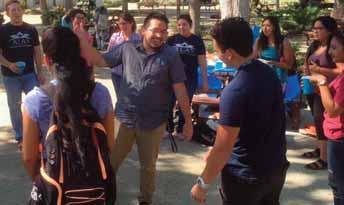
In addition to providing facilities and services to help ALAS students flourish academically, the ALAS Intercultural Learning Center hosts social activities like this pizza party. Photo by FPU
gration Policy Institute), many of whom were brought to the United States as young children. From 2001 to 2010, FPU’s Samaritan Scholarship was the lifeline that each year made Christian higher education at FPU a possibility for just one or two exceptional new students from this population.
In 2010 the state of California passed Assembly Bill 131, making the Cal Grant available to qualifying undocumented students. Now the annual $200,000 budgeted for the Samaritan Scholarship (1.5 percent of the university’s institutional aid) helps about 25 immigrant students each year.
Standards for these scholarships remain high, and competition is stiff.
“Many of our Samaritan Scholars are still above 4.0 grade point average in high school, class presidents, exceptional musicians or athletes,” says Endicott. Last fall 30 students competed for the eight scholarships granted for this school year.
According to Endicott, Samaritan scholars have lived up to the high standards of that first recipient who went on to study medicine and is now working at a medical clinic in his home community. The 40 other graduates have gone on to
careers in medicine, academia, public policy and many other fields. The students’ drive and determination, he says, is reflected in a phenomenal 100 percent graduation rate over the scholarship’s history.
Cindy Jurado Hernandez has worked with many Samaritan scholarship recipients in her role within the FPU Office of Spiritual Formation and now as interim director of the scholarship. She describes the typical Samaritan scholar as a person who graduates from high school near the top of his or her class and aspires to pursue a professional career. Culturally they are American, and some learn about their undocumented status for the first time when they begin to complete the applications for university.
Special supports through the Samaritan Scholarship build on these students’ strengths, says Hernandez. Each Samaritan scholar is part of a cohort, a group that offers mentoring, service projects, leadership opportunities and participation in leadership and policy conferences.
Even with the scholarship funds, Samaritan scholars struggle financially. Their low-income families cannot provide much in financial help so they often
have to work many hours while keeping up with their studies. One recent graduate cleaned houses and picked strawberries in order to finance an internship semester in Washington, D.C., as part of her political science studies.
Assistance from FPU in the form of free use of computers, printers and copy machines at the campus Intercultural Learning Center is another way the university supports its students from immigrant families. The center, whose services are available to any FPU student, is part of a program called ALAS (Advancing Latino/Latina Academic Success).
Through a federal grant secured in 2015, the university established ALAS to encourage Hispanic and low-income students to enroll in and graduate from FPU. ALAS’s special supports and counseling ensure that first-generation college students create and follow an academic plan that allows them to graduate in four years.
Whether undocumented or citizens, students who are the first in their family to attend college need assistance navigating the unfamiliar and sometimes intimidating academic environment. So, in addition to technology resources, ALAS provides academic supervision, peer mentoring and career advising.
ALAS Director Gina Ponce de León is quick to point out that their program serves students without regard for their immigration status. “Helping you is our objective,” she says. “I believe the way of helping [undocumented] students is treating them as anybody else, because that’s what they are.”
Five years ago, the federal government recognized the unique situation of the undocumented young adults who had been brought as children to the U.S. They had been educated in U.S. schools and were ready to move on to become contributing members of the communities they had grown up in.
Whether undocumented or citizens, students who are the first in their family to attend college need assistance navigating the unfamiliar and sometimes intimidating academic environment. “ “
With the establishment of Deferred Action for Childhood Arrivals (DACA), the Obama administration granted qualifying students who had arrived in the U.S before the age of 16 a protected status. The executive order allowed students who registered with the government to pursue their academic and career goals, laying aside concern that their lives would be disrupted by a visit from Immigration and Customs Enforcement (ICE).
Deportation fears distract students
The Trump administration has continued to uphold the DACA policy, though fears have risen at the new administration’s calls for more restrictive immigration policies and more aggressive deportation of the undocumented. In the early months of the new administration, a few DACA students in other parts of the country have been detained by ICE.
Hernandez reports that concern about the possible deportation of family members who don’t have special protections distracts students from their academic pursuits. Two of FPU’s Samaritan scholars have taken a leave of absence, partially because of the political environment. “We have assured our students that there are allies and advocates for them on campus. Our priority is to ensure they stay in school and are successful,” she says.
Emotional support from FPU faculty and staff is vital to enable students to remain focused on their academic goals in a time of uncertainty. Hernandez checks in with them weekly.
Endicott recalls a recent conversation with a Samaritan Scholar who is a student leader and is employed on campus. “I asked, ‘How are you doing?’ and she just started to cry. This fear is so palpable and huge.”
The experience takes Endicott back to the meaning of the name of FPU’s scholarship—The Samaritan Scholarship. “This is the Samaritan story of who is our neighbor and how do we love them?”
Loving Samaritan scholars at FPU means coming alongside to help them pursue their life goals, explains Ponce de León. “As a Christian university, we’re not looking at you as if you were a foreigner, someone who doesn’t belong. I respect you for who you are and expect you to be successful.” —Kathy Heinrichs Wiest
Accessible, affordable resources “an answer to prayer”
Eddie Johnson has been in ministry of one kind or another for 33 years. Currently, he serves as part-time pastor at two congregations in the North Carolina District Conference (NCDC): Beechbottom MB Church in Newland and Darby MB Church in Ferguson. These congregations are small; Beechbottom has six to eight attendees on a typical Sunday morning, while Darby sees 10 or 11.
Still, Johnson serves faithfully and with joy. “Each time we gather, I have the greatest interest in the people who come to know the Word of God,” he says. “I’m happy to be there in both places.”
Until now, Johnson has had no formal ministry training. While he’s studied on his own and “learned a great deal” from other ministry leaders over the years, he’s never been to seminary or even finished his college degree.
But now, through a new partnership between NCDC and The Urban Ministry Institute (TUMI), the national training arm of World Impact, Johnson and other church leaders in the community are being equipped for more effective ministry.
TUMI Lenoir began in August 2016 in the facility of The Life Center, a USMB congregation in Lenoir, NC, with 16 students in the first course. Students who see the program through will graduate in four years. In addition, mentors and teachers are being prepared so that another class of TUMI Lenoir students can begin in the fall of 2017.
More recently, Latin American MB (LAMB) churches also affirmed adopting TUMI as their resource for leadership development in the district. Moises Tagle, LAMB district moderator, is leading the program in both English and Spanish, and Mission (Texas) MB Church is hosting the first class. For more on the partnership between USMB ministries and TUMI, read this online story: www.usmb.org/TUMI trains leaders
An answer to prayer
TUMI Lenoir is “a dream come true” and an answer to prayer, according to Terry Hunt, NCDC minister and pastor at The Life Center. At a dinner during one of the many meetings he attends as district minister, Hunt was introduced to Don Davis, founder and director of TUMI, and shared his vision to equip NCDC leaders with seminary-level training. When Davis in turn talked about TUMI’s low-cost, easily-accessible curriculum and explained that it could be offered as a satellite program in Lenoir, Hunt saw an opportunity.
“That was a prayer answered,” he says.
As the name implies, TUMI is designed especially for ministry leaders in inner city areas. World Impact, TUMI’s parent mission organization, focuses especially on America’s unchurched urban poor, facilitating church planting movements by evangelizing, equipping and empowering.
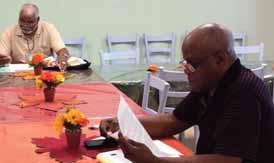
NC, isn’t exactly inner city. In fact, Clyde Ferguson, site coordinator for TUMI Lenoir, calls it a rural area.







But the reasons TUMI fits so well in urban areas are the same reasons it fits in the NCDC.
Hunt points out that the TUMI Capstone Curriculum, a 16-module, seminary-level training program, can be useful anywhere there is a need for equipping leaders. “Since almost half of our pastors and leaders did not get a chance to attend a Bible college or seminary, this has proven to be an excellent way to provide them the training they need,” Hunt says.
The NCDC district is small, with only seven small congregations and limited resources, so TUMI’s low cost is a plus. Students can attend TUMI Lenoir for as little as $90 per eight-week class. Books add another $65 to $70, but
Ferguson notes that The Life Center provides a library of the necessary books in an effort to remove that potential obstacle.
“We make it affordable,” he says.
In addition, Ferguson says, the curriculum is understandable to those who don’t already have a seminary education. In some curriculum, he notes, the language can be intimidating, but TUMI’s curriculum is in everyday language. But that doesn’t mean it’s not rigorous material. “It’s very challenging,” Johnson says, especially when it comes to test time.
TUMI is perfect for those who, like Johnson, are serving in pastoral roles. But it’s also designed for those serving in other areas of ministry—deacons, teachers, Sunday school teachers, small group leaders—“anyone who
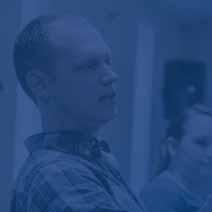



feels called to ministry at any level,” Hunt says.
At first, Johnson was reluctant to try TUMI. At age 68 and facing health difficulties, he wasn’t at all sure he’d be up for the challenge. But he’d always wanted seminary-level training. “I thought I’d be interested in opening up my understanding even greater of what I already know about the Word of God.”
And TUMI has done just that for him. He compares the coursework to “prospecting” the Word of God, looking for “gold nuggets” of truth that he can apply first to his life, then offer to his congregations.
The knowledge he gains is more than head knowledge. Ferguson, who is the primary teacher for TUMI Lenoir, is impressed that TUMI’s curriculum always brings it down to a personal level, challenging students’ daily walk. As ministry leaders understand how God’s Word applies to their own life, Ferguson says, they become better leaders.
Johnson agrees: “I’ve got to shine the light in my own life first before I can look into someone else’s.”
As he digs deeper into Scripture and his own faith, Johnson is able to minister more powerfully at Beechbottom, Darby and in his everyday life in the community. He says the coursework has helped him to study more effectively, quote Scripture more often and lay out the truths more fully when preaching. “Oh, yes, it’s a real help,” he says.
In addition, as he goes about his everyday conversations, the TUMI coursework has helped him to keep the focus where it needs to be—not on his own opinions, but on the Word of God. “I do a little more listening than I do talking,” he says.
Johnson says he didn’t think he’d be able to go as far as he has, but he is al-
ready looking forward to continuing his TUMI training. “I love the church. I love people. My greatest hope is that my light will shine and exemplify Christ,” he says. TUMI Lenoir is equipping him to shine that light more brightly.— Myra Holmes
New and improved doesn’t always mean better. A favorite cereal now comes in a more colorful box—with fewer servings. A laundry soap’s “new formula” provides more fillers, not more cleaning power.
But in the case of FaithFront, Tabor College’s new and improved leadership development program aimed at high school students, it’s more than pretty packaging. FaithFront offers improved resources for local congregations and students while keeping the heart of the former program: to call and equip young leaders for ministry.
FaithFront has its roots in Ministry Quest, which began in 2002 as a program of the Mennonite Brethren seminary, then known as MB Biblical Seminary and based in Fresno, Calif. It was funded through a grant from Lilly Endowment, a private philanthropic foundation, intended to develop programs at seminaries to nurture the next generation of ministry leaders. Tabor College, the MB liberal arts college based in Hillsboro, Kan., picked up the program in 2011.
When the Lilly Endowment recently offered a new grant for leadership development programs through undergraduate institutions, Tabor took the opportunity to take the best of MQ and roll it into a new program; FaithFront (FF) launched in August 2016,
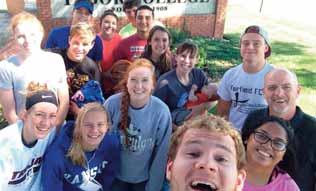
funded by grant monies and a subsidy from USMB.
“Essentially the heart of what we’re trying to do is the same,” says Wendell Loewen, director of FF and professor of youth, church and culture at Tabor. “We’re trying to nurture young leaders for the church.”
While MQ was a one-year program, beginning and ending with retreats, FF offers three levels of involvement, providing more entry points for potential leaders and more resources for congregations.
Explore seminars, hosted at local congregations, offer the most basic level of involvement. While the focus is a basic exploration of leadership and calling, the format of an Explore event flexes according to the requests of the host congregation.
Hillsboro (Kan.) MB Church has hosted two Explore workshops and invited the FF team to lead a regular Wednesday evening youth group.
“FaithFront is an exceptional resource available to us at no cost. That’s incredible,” says youth pastor Sara Jo Waldron.
“It would be foolish to not utilize FaithFront for blessing, teaching, equipping and empowering our youth to live out their lives for Jesus.”
For students whose interest is sparked, Elevate weekend retreats develop a higher understanding of calling, cultural engagement and leadership. The first retreat was held in October 2016; the second was held April 29May 1. Participants heard call stories, discussed biblical theology and engaged culture through movies and music.
Encounter then offers an experiential “mobile lab” to put Christian leadership skills into practice. The first Encounter will take place July 22-28. Participants will travel by bus to Denver, Colo., where they will serve the homeless, work with church planters and meet Christian business owners. Participants will then travel to Garden City, Kan., where immigration and refugee issues are front and center, giving students opportunity to engage a cultural issue. Time on the bus will be filled with intentional learning, spiritual formation activities and community building.
The ultimate hope for all three FF offerings is to equip future leaders.
Loewen points out that top-tier high school students interested in careers such as medicine or business have ample opportunities to explore those options, but fewer opportunities exist for those interested in ministry.
So FF aims to work with local congregations to provide opportunities for these potential ministry leaders. “This is where we want to partner with the local church and be a resource for them in helping identify and nurture leaders for the future,” Loewen says.
Waldron believes FF is already making a difference for the young leaders in her congregation. “I believe that what FaithFront has offered to our young people will significantly impact the future of our congregation in incredible ways,” she says. “It may take years to see the fruit of that, but I believe we will see it.”
For more information on FaithFront, visit www.faithfront.org. –Myra Holmes
Borders are intended to divide and separate, and the border between Mexico and the U.S. has been the subject of especially divisive rhetoric in recent months. But when a group of Mennonite Brethren pastors visited that border recently, it was an opportunity to connect and come together.
Mennonite Central Committee (MCC) invited nine MB pastors—five Hispanic and four Anglo—from the Pacific District Conference (PDC) on a border tour March 5-9. The purpose was not only to educate and inform but also to build relationships between Anglo and Hispanic MB leaders.
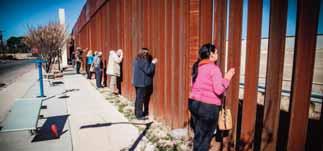
MCC regularly hosts similar border tours for schools, church groups and organizations. This tour was initiated by Dina Gonzales-Pina, MCC’s ethnic and gender equity specialist, and Nate Yoder, executive director of MCC West Coast, who intentionally selected a group of MB leaders representing different languages, cultures and generations.
Activities were designed to give a balanced view of immigration issues, but the bigger goal was to foster relationships. Gonzalez-Pina, who along with her husband leads Iglesia La Gran Comision, a Hispanic MB congregation in Hanford, Calif., sees a gap between Hispanic and Anglo Mennonite Brethren in California’s Central Valley. “It saddens my heart,” she says.
Sharing accommodations and meals was a first step to begin to bridge that gap. Tour participant James Bergen, pastor of North Fresno (Calif.) MB Church, talks about making the acquaintance of fellow tour participant Cristobal Aleman, pastor of Iglesia Hermanos Menonita West Park, Fresno. Although the two minister in the same community, they had never met. “We know each other now,” Bergen says. “Awareness and friendship happened.”
Wrestling with complex issues provided opportunities to go beyond acquaintance. Gonzalez-Pina says, “I think there’s nothing better as spiritual
leaders than to hear each other, walk with each other, to lean into these issues together.”
Sam Resendez was drawn to the tour out of “a real concern” for immigration issues. Resendez has served as a Hispanic MB leader, church planter and pastor in the PDC for over 40 years; he currently pastors Iglesia La Roca, Sanger, Calif. Not only does he have firsthand experience with immigration, having crossed the border as a young child, but he also serves a population for whom changing policies have deep impact. “They are scared to death,” he says.
It was helpful, he says, to engage the issues alongside Anglo MB pastors. “Maybe by doing some of these activities, making people aware of the issues, maybe that way we can get closer,” Resendez says.
In a culture increasingly separated and isolated by culture, issues and even electronics, Resendez says that intentionally building relationships is the first step toward finding solutions.
“When you know someone, you begin to care about that person,” he says. “When you see misery, when you see need, if you see it from afar, maybe you don’t care. But when you see it next to you, when you are looking at the face of the person, it’s totally different.”—CL
Neighborhood Jobs offers young men training, experiences
Neighborhood Church is a church plant just outside of downtown Fresno, Calif., in the Jackson Neighborhood. We mobilize our neighbors to love their community and seek its renewal. As a church we oversee a family of nonprofits which meet specific needs in our neighborhood with specialized care, a weekly church service at Jackson Elementary School and a small business employing neighbors with barriers to employment.
Having a church gathering in a school cafeteria on Sunday afternoon in Fresno has its drawbacks; a lack of air conditioning during the hottest time of the day is one of them. On the other hand, the school also provides fertile soil for community-building. Life is already happening here: Kids laugh on the play structure, teenagers find solace on the basketball courts and relationships take root at this common place.
Last summer we met some teenagers who played basketball every Sunday at the school. I can’t say we got off on the right foot. They would walk into the cafeteria to get water, sometimes during the sermon, blaring explicit music. It was uncomfortable. Their presence in our controlled worship gathering was more than distracting. At times their interruptions were so loud we wondered if they were intentionally causing a scene. But they were our neighbors, and we are called to love them.
We chose to journey with these boys, and while questioning what it looked like for us to love our neighbor, a business unfolded. We are in a neighborhood with high unemployment, and we realized these teenagers wanted to work.
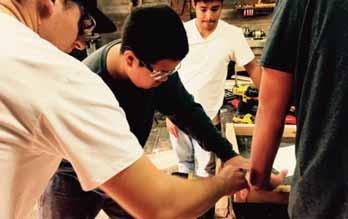
They applied for jobs but could not get hired.
Some people in our church started enlisting them to do odd jobs around their homes, and a solution developed. What if they weren’t our church’s problem but our neighborhood’s asset? Within our neighborhood, there are plenty of older folks who needed help around the house. Among our neighborhood’s 923 homes there were 923 lawns to be mowed, fences that need painting and windows that need fixing. Our company, Neighborhood Jobs, was being born.
We renovated an abandoned workshop in the neighborhood and turned it into an artisan space where these boys could learn job-transferable skills. By teaching trade skills like plumbing, welding and woodworking, we equip them to provide excellent work for homeowners who have odd jobs to be completed. Neighborhood Jobs can also build beautiful high quality Free Little Libraries at a competitive price. Anyone that hires Neighborhood Jobs
to build a Free Little Library provides an opportunity for a teenager to prove their potential.
The boys who once caused a distraction are now being mentored in life and job ready skills. One of them has even decided to follow Jesus! These boys have become a part of our church family. They have a pastor who they often visit, a handful of references, a community of mentors and job experience. Doesn’t this sound like what Jesus meant when he said, “Love your neighbors?”
We thought these boys were diverting us from God and his work when they were actually drawing us near to him. These boys would have never joined our weekly church gathering if the Lord had not used our small business as their onramp. Jesus promises that he is “making all things new,” and we believe him. He is using Neighborhood Jobs (www.neighborhoodjobs.info) to transform a neighborhood one life and one job at a time.—Grace Spencer and Joe White
My best friend died unexpectedly this past Christmas Eve.
In the midst of my overwhelming grief came another source of worry: I was supposed to lead the family devotional for our Christmas Day service. I spoke with James, my lead pastor, and through tears explained why I was unable to preach the next morning.
“I am too sad,” I explained. “Christmas morning should be a happy time for our families.”
“Why?” he asked. “This is not a happy time for you, and I am sure there are people in our congregation who are struggling in this season, too. I would still like for you to preach if you are able.”
In the church, we sometimes find our greatest challenges when being open with our pain or frustration. There is an assumption that Sunday services are meant for joyful praise and smiling faces. We gather together for serious discussion or thoughtful study and sometimes forget to provide space for brokenness to be seen or felt. We worry how others will respond to our emotions so we hide them or deal with them outside of our congregational community.
Working with children, I have been taught that I function best with a happy or serious face; I bring fun and discipline to our ministry. But what about the times I am discouraged or fatigued? Is it appropriate for me to cry in front of preschoolers when I spend so much time comforting them?
Researcher Brene Brown shares in her TEDTalk, “The Power of Vulnerability,” that in order for connection to happen we have to allow ourselves to be seen. Really seen. She goes on to say that many times people allow shame to dissuade them from being open and honest about their hardships or difficult emotional state. We are hardwired to want to hide the most hurt parts of who we are. However when we allow ourselves to be vulnerable with others, including children, that is when our capacity for compassion and understanding really shines. That is when we connect deeper with God as well as our neighbor.
As adults, we need to be reminded to be open with each other and, what I often fret over, with our kids. Our authentic responses reveal our humanness but also show the work of the Spirit in us as we experience joy from a new baby, shock from a diagnosis, anger from national injustice. I believe the church should be the place where individuals are allowed to be their most real selves.
I did preach on Christmas Day, surrounded by the children in my church family. As we sat on the stage steps together and talked about Jesus, I wept. My heart burst for the loss of Kevin and my heart burst for these kids who go into the world to shine the light of Christ. As I stood up to pray, I felt two little arms wrap around me in a tight hug. I knew then it was OK to cry in church.◗

Caitlin Friesen is a native of Fresno, Calif., and graduate of Fresno Pacific University. She has a passion for Jesus and a heart for kids, both of which have been put to use as a backpacking guide, outdoor educator and camp counselor. She recently married her favorite person in the world, Ben Friesen from Guthrie, Okla. She serves as the associate pastor of children and family ministries at North Fresno Church.
My mother-in-law has stayed with us some since Claire was born, helping with housework, nighttime and cooking. The other day after making dinner, she asked me this question: Why do you leave your eggshells in the carton?
The question made me pause. It’s what my mom always did. I had never considered there might be an alternative way to dispose of eggshells. I figured Mom, wise matriarch that she is, had a good reason. So I asked.
Turns out the answer isn’t terribly profound: Sometimes it’s easier than walking a dripping shell across the kitchen to the trash without leaving a trail of egg goo.
This reminded me that sometimes a person needs to step back and evaluate the motives behind his or her actions.
Jesus’s parable of the praying Pharisee and tax collector (Luke 18:9-14) is a good example of this. Two men went to the temple to pray, but only one came home justified before God.
I’ve found that assessing my motivation is especially important when it comes to worship, both personally and in planning corporate worship times. When we do things only because that’s the way they’ve always been done or because someone prefers it, it’s time to consider change.
Yes, there is a lot to be said for consistency. Things that are done effectively and with excellence should be continued, and traditions with significance are essential to a church family. But consistency without meaning is worthless.
Remember when the disciples were having trouble fishing? They consistently dropped their nets but caught
nothing. It wasn’t until they followed Jesus’s call to throw their nets over the other side that they were successful (John 21:1-6).
Though the “worship wars” (an odd term for Anabaptists) are waning, tension still exists. But the conflict can no longer be defined as generationally driven. Grumbles I hear—or “constructive criticism”—about song selection seem to come instead from members of one genre’s camp or another.
Worship should never be about the genre. When planning or participating in a service, we should ignore style, focusing instead on content, how songs minister within the service and how they direct glory to God. There is so much opportunity in all the music in our churches.
Repetitive contemporary songs, crudely labelled “seven-elevens,” are in most cases employing repetition to reinforce something important. Think “holy, holy, holy.” And a nine-stanza hymn that staggers on and on is often telling a very profound truth through prose. Eliminating a verse or two in the middle, as is conveniently often done, weakens the song’s integrity.
It’s not a style issue. It’s a heart issue. We are each created with a specific way in which we are more inclined to worship, but we must evaluate our motives and remain open to being called down another course.
When Jesus commands us to cast the nets on the other side, we benefit when we obey. Or, to use a more secular cliché, you gotta break a few eggs to make an omelet. What you do with the shells is completely up to you.◗

David Vogel serves as the worship director at Hillsboro (Kan.) MB Church, where he has been on staff since 2013. He and his wife, Hanna, welcomed their first child, Claire Elizabeth, in January, and live in Hillsboro, where David operates a graphic design studio. David is passionate about using music and multimedia to create an environment of authentic and passionate worship.
Prayers for local churches are being answered
“Let a man so consider us, as servants of Christ and stewards of the mysteries of God. Moreover it is required in stewards that one be found faithful,” 1 Cor. 4:1-2 (NKJV).
The North Carolina District Conference (NCDC) is seeking God to remain faithful as we, servants of Christ, embrace the USMB Future Story as our own. We have affirmed that the three core commitments (church multiplication/evangelism, discipleship and leadership development) are essential to the future of our district. We are very excited about the opportunities to network with other churches throughout the U.S. and to empower local churches to achieve their full ministry potential as it relates to the three core commitments.
As a district, our first focus has been reaching out to the local churches. On the second Saturday of each month pastors and church leaders gather to discuss local church needs, strengths and desires.
Leadership development is one of our greatest needs as current leaders are all in their 40s, 50s and 60s. We are very concerned about who will be leading the district in the next 10 to 20 years. Therefore, we must seek the Lord of the harvest to send out laborers (leaders) into the district. According to Luke 10:2 we are to “plead with the Lord of the harvest to send out more laborers to help you, for the harvest is so plentiful and the workers so few” (TLB). So, we are borrowing a practice from the Canadian Mennonite Brethren. We set our cell phone alarms at 10:02 a.m. every day to remind us to pray.
What results have we seen from praying this prayer daily? John Hodge, 30-something youth pastor, came to visit his father during Christmas 2015 and moved his family here in February 2016. He is now serving as the youth pastor at The Life Center in Lenoir.
The church has experienced tremendous growth in their middle and high school programs, especially on Wednesday nights.
Boone MB Church is experiencing a resurgence from the community to attend and to support the outreach efforts of the church. In February, three young adults gave their lives to Christ Jesus on a Sunday morning after a powerful message from Pastor Mike Mathes. To God be the glory! Efforts to strengthen the church leadership and to network with other churches have been beneficial.
Attendance at Bethel MB Church in Lenoir has increased from 40 to over 100 on Sundays. Pastor Johnson Granados is very thankful and excited about the growth of young families that are now attending. The church is in the process of remodeling the downstairs to add more classrooms to accommodate the growth.
A new church in Knoxville, Tenn., is in conversations with NCDC about the potential of becoming Mennonite Brethren in the near future. Leaders from Grace and Peace Fellowship and the NCDC are meeting and worshiping together to start working toward this future partnership. We continue to be encouraged while God answers our prayers.
To help with our leadership development, we have scheduled a LEAD ONE workshop in May with USMB national director Don Morris and Stephen Humber with MB Mission. The goal this year is to focus on our three core commitments by empowering each local church to use their God-given gifts and talents for kingdom building. What a joy it is to serve in this district!◗

Terry W. Hunt is pastor of The Life Center in Lenoir, NC and has served as the North Carolina District Conference minister since 2005. Hunt has lived and worked in North Carolina his entire life and spent 17 of 31 years in the pastorate as a bivocational pastor while working as a plant manager in the furniture industry. He is very active in his community and with USMB. He and his wife, Kathy, have four daughters and four grandchildren.
Michele, Meagan, Tanner and Cooper Eiland and Lucas Rupke were baptized March 19 at North Oak Community Church, Hays, Kan. Lance and Jessie Albin, Savannah Clingan, Darrell, Michele, Meagan, Tanner and Cooper Eiland, Kaleb Neher and Mason Wellbrock were received as members.
Caleb Harrell, Julia Appleton, Cameron Qsar, Joe DeStephano and Elijah Tran were baptized Jan. 29 at Laurelglen Bible Church, Bakersfield, Calif.
Sam and Amanda Auchterlonie, Charles and Pam Carter, Nate and Angie Enegren and Diane Varnell were received as members March 5 at First MB Church, Wichita, Kan.
SMCC Draper (Utah) Campus celebrated nine baptisms March 19: Cheryl Merrell, Draven Hodges, Andre Gower, Kevin Morf, Dominic Hofheins, Katie Busenbark, Noah Beverly, Kristin Glendening and Hayden Curtis. Ron and Mechelle Harrington were baptized Jan. 22. Austin Kakunes, Bob Anderson, Dan Cohen, Jennifer Braun, Keri Evans, Landon Avery, Lucas Reynolds, Michael Cupello, Mikhail Karniayenka, Richard Thiessens and Sarah Mathis were baptized Nov. 13.
Marisol Aroztegui Yanez, Juan Carlos YanezFimbres, Veronica Fimbres Burgos, Cristina Yanez Fimbres Mariscal and Sergio Islas Arriaga were baptized March 5 and received as members of Garden Park Church, Denver, Colo. Seventeen others also were received as members.
Emily Kocik, Shelby Callihan, Ryan Gill and Amanda Bates were baptized in late 2016 at SMCC West Jordan (Utah) Campus. Sydney
Ibanez, Jarin Bell and Allison Shontz were baptized in early 2017.
Grace Community Church, Sanger, Calif., welcomed 15 new members March 19: Jeremy and Cinthia Dunn, Daniel Bibb, Omar Hernandez, Josh Finke, Adrian Herrera, Joyce Provost, Michelle Moss, Gavino and Liz Barrera, Martin and Maureen Munoz, Jackie Taylor, Katie Taylor and Nick Marshall. Elizabeth Barrera, Jessica Herrera, Michelle Moss and Joyce Provost were baptized March 12.
Vincent Kaping was baptized Feb. 19 at Shorelife Community Church, Capitola, Calif.
Alexa Reddig and Elijah Lenihan, of Lustre (Mont.) MB Church, were baptized Dec. 11 in the Jordan River in Israel.
Leon Barkdall was baptized Sept. 11 in Big Creek and was received as a member of Martin Box MB Church, Marshall, Ark
Elijah and Heather Bergman, Eugene and Julia Feil, Tom and Caryn Funkhouser and Mark and Debbie Huntley were received Feb. 19 as members of Rosedale Bible Church, Bakersfield, Calif.
Gary Kliewer, Garrett and Shayli Hill and Gavin, Dora and Andre Miller were received Jan. 22 as members of Pine Acres Church, Weatherford, Okla.
Holly Friesen was baptized Feb. 5 and received as a member of Shafter (Calif.) MB Church.
SMCC St. George (Utah) Campus celebrated one year in their new facility March 25. As part of the celebration, attendees wrote down prayer requests and included them in a time capsule that will be opened on the building’s 10-year anniversary.
Les Mark remembered

Leslie Earl Mark died Feb. 26 at the age of 92. He served faithfully and enthusiastically as a Mennonite Brethren pastor, missionary, mentor and university professor, the last most notably teaching classes at the University of Guadalajara (Mexico) and as a long-time faculty member at Fresno Pacific University, the Mennonite Brethren school headquartered in Fresno, Calif. Prolific in both English and Spanish, he loved and

Bethany Church, Fresno, Calif., celebrated 75 years of ministry with an anniversary service and luncheon Feb. 26. More than 500 people enjoyed a festive time that included the regular worship team along with a celebration choir of 50 singers from various churches, a men’s quartet known as “The Bethany 4” and videos featuring former senior pastors and historical review.
Current lead pastor Brian Wiebe preached, and Gary Wall, Pacific District Conference minister, brought greetings. Guests were invited to stay for lunch and enjoy historical displays, branded products and a 75th anniversary cookbook.
Bethany Church began in Fresno in 1942 out of the Reedley (Calif.) MB Church. The congregation built and settled into a building of their own on Olive Avenue in 1946 and moved to the current location in north Fresno in 1986. Through the years, Bethany assisted in the planting of several other Fresno-area Mennonite
Brethren churches, including Sunset Gardens MB Church, West Park MB Church, Butler MB Church, North Fresno Church, College Community Church MB, Mountain View Community Church and Eagles’ Harbor Community Church.
served communities in Mexico and both language communities in the U.S., including a time as associate pastor at Bethany Church, Fresno, Calif. He was married to Erlene, who predeceased him in 2002. He is survived by two sons, David and wife Wendy, and Steven and wife Barbara, six grandchildren and nine great-grandchildren.
Attendees of Reedley (Calif.) MB Church were invited to write verses of Scripture on the exposed walls of the new office complex Feb. 12. The building project was necessitated by a fire in August.
Mark Brumbaugh resigned as associate pastor at Enid (Okla.) MB Church in January.
Bartel, Daryl E., Hillsboro, Kan., of Hillsboro MB Church, July 5, 1952—Feb. 11, 2017. Parents: Eldon A. and Ethel (Duerksen) Bartel. Spouse: Darlene Schmidt. Children: Lance, Corissa Mangus; three grandchildren.
Bartel, Jonathan Harvey, Salida, Colo., retired missionary and former member of Belleview Community Church, Littleton, Colo., Jan. 31, 1919—Feb. 3, 2017. Parents: Henry C. and Nellie (Schmidt) Bartel. Spouse: Alice Wiens. Children: Daniel, Stanley, Gloria Combs; five grandchildren.
Frantz, Anna Emily, Reedley, Calif., member of Butler MB Church, Fresno, Calif., Oct. 31, 1928— Feb. 2, 2017. Parents: Emil Peter and Lydia (Ratzlaff) Frantz.
Ollenburger, LaVina June, Buhler, Kan., of Buhler MB Church, Sept. 7, 1923—Feb. 25, 2017. Parents: Henry T. and Elizabeth (Esau) Ediger. Spouse: Ruben Ollenburger, deceased. Children: Jaryl, Charlene Lingo, Royce; five grandchildren; 10 great-grandchildren.
Schroeder, Delano, San Jose, Calif., member of Lincoln Glen Church, San Jose, Oct. 8, 1932—Jan. 7, 2017. Parents: Henry and Sarah Schroeder. Spouse: Frances Schroeder. Children: Colleen, Dan; three grandchildren.
Ulrich, Lucy, Springfield, Mo., member of Fairview (Okla.) MB Church, Sept. 15, 1947—March 2, 2017.
Parents: John and Helen Karber. Spouse: Reuben Ulrich. Children: Michelle Kopper, Delton, Luann Weller; four grandchildren.
Vix, Annette, Wichita, Kan., member of First MB Church, Wichita, March 17, 1959—Feb. 11, 2017. Parents: Milton and Melita Janzen. Spouse: Lyndon Vix. Children: Kayla, Kelyn, Kyndra Mullins. Wiens, Leland E. “Lee,” Fresno, Calif., member of North Fresno (Calif.) MB Church, March 2, 1941— March 21, 2017. Parents: Otto and Eva (Epp) Wiens. Spouse: Grace. Children: Michelle Avila, Mark, Melissa, Elizabeth McCormick; nine grandchildren.
Hillsboro (Kan.) MB Church offered a class on “Hopeful Parenting” Feb. 5 and 12. The church offered a 10-week class on “Defending Your Faith” this spring.
North Oak Community Church, Hays, Kan., offered a prayer training workshop March 4.
Women from Valleyview Bible Church, Cimarron, Kan., watched the movie, “The Case for Christ,” then went out to dinner together April 8.
Attendees of Bible Fellowship Church, Rapid City, SD, attended a hockey game together April 7. The church hosted a “King and Princess Ball” for fathers and daughters March 18.
Men from Shafter (Calif.) MB Church had breakfast March 25, then divided into four teams to plant up to 12 gardens for those from the church
B
ob Kroeker, long-time MB missionary, district leader and pastor, died Feb. 27 at the age of 88. Kroeker and his wife, Wanda, served with MB Mission in the Republic of Congo, now the Democratic Republic of Congo, for 21 years. After returning to the U.S. in 1974, Kroeker served as a lead pastor in several California Mennonite Brethren churches; as director of the MB Christian Service program; on the Boards of Faith and Life and Home Missions for the Pacific District Conference (PDC); in short-term ministries in Minot, ND, and Lithuania; and as chaplain at Palm Village Retirement Community, Reedley, Calif.
community who wanted one.
High school students from Enid (Okla.) MB Church held a “non-Valentine’s” party Feb. 11, with games and food. Volunteers from the church prepared and sent care packages to college students in February.
Families from Salem MB Church, Bridgewater, SD, went bowling March 26.
Men from Zoar MB Church, Inman, Kan., known as “Fishers of Men,” went on a fishing retreat April 28-30.
Attendees of Copper Hills Church, Phoenix, Ariz., participated in a wiffle ball tournament March 25. The tournament ended with free music and food, called “blues and brats.”
When there is a fifth Sunday in the month, Rosedale Bible Church, Bakersfield, Calif., hosts an evening potluck and devotes time to pray for the congregation, community and nation.
Mountain View Community Church, Fresno, Calif., offered a welcome lunch March 5 especially for new attendees who speak Spanish.
Seniors at First MB Church, Wichita, Kan., known as “Primetimers,” held a Valentine’s dinner and musical program Feb. 14.
Families from Laurelglen Bible Church, Bakersfield, Calif., gathered for a game night Feb. 3.
Women from Buhler (Kan.) MB Church meet Monday evenings to embroider tea towels. Youth offered free childcare on Valentine’s Day.
Seniors from North Fresno (Calif.) MB Church toured an air museum in February, went to the zoo in March and enjoyed an Italian dinner in April.
Women from Reedley (Calif.) MB Church gathered Feb. 23 for “Coffee and Canvas” to learn to paint and enjoy snacks and specialty coffee drinks.
Bethany Church, Fresno, Calif., offered a baseball
Robert Carl Kroeker was born on Sept. 16, 1928, in Bakersfield, Calif., to Jacob E. Kroeker and Zelma Louise (Friesen) Kroeker. He married Wanda Mae Collins June 10, 1949. They had four children: Richard, Cherie, Gordon and Cyndi.
He is survived by his wife, Wanda; son Gordon and wife Luise of Minot, ND; daughter Cyndi and husband Merlin Schnase of Minot; son-in-law John Musgrave of Clovis, Calif.; 11 grandchildren and 21 great-grandchildren.

clinic March 3-5 for children ages seven through 12.
Women from North Oak Community Church, Hays, Kan., brought two of their “favorite things” to an event Feb. 25. Breakfast was served.
As part of their February service project, children from College Community Church MB, Clovis, Calif., decorated Valentine’s Day cookies for the congregation’s Feb. 12 coffee and fellowship time.
Attendees of Laurelglen Bible Church, Bakersfield, Calif., gathered in the church courtyard Jan. 1 for an evening of worship and prayer based on the theme, “Ascribe to the Lord the glory due his name.” Coffee and hot chocolate were served.
Valleyview Bible Church, Cimarron, Kan., honored first responders and law enforcement during worship Jan.15. A potluck followed the service.
Jan. 15 was “Back to Church” Sunday at Salem MB Church, Bridgewater, SD. Attendees were encouraged to bring friends.
Neighborhood Church, Fresno, Calif., and House of the Gospel, Fresno, partnered to host an Easter event April 15 for the community at an elementary school.
Shorelife Community Church, Capitola, Calif., hosted a community block party April 13, with a free BBQ, games and a raffle.
Neighborhood Church, Visalia, Calif., invited church and community children to four mornings of “Fun in the Park” during spring break, April 10-13. Each
Senior Pastor: Cornerstone Community Church in Topeka, Kan., is an evangelical congregation seeking a senior pastor. Our mission is to be a “vibrant community of faith and love, dedicated to passionately knowing and making known the hope and relevance of Jesus Christ.” The candidate should have a passion for people, strong leadership and teaching skills and the ability to disciple and develop leaders. Applicants must be in agreement with the Mennonite Brethren Confession of Faith
day had a theme: sports and Nerf, art, science and an “eggstravaganza” with inflatables.
Amor y Fe, the Spanish-language congregation of Butler MB Church, Fresno, Calif., hosted a threenight outreach event March 24-26. The theme was salvation and healing in Christ, and Spanish-language activities were translated into English.
Youth from Lustre (Mont.) MB Church spent a full day Dec. 14 visiting nursing and retirement homes, singing Christmas carols and visiting with the residents.
Volunteers from North Park Community Church, Eugene, Ore., worked with community volunteers March 21 to package breakfast and lunch bags for kids who need food security during Spring Break.
A team of youth and leaders from First MB Church, Wichita, Kan., served in Vancouver, Canada, March 17-24.
A team from Buhler (Kan.) MB Church served in Haiti Feb. 25-March 7. They worked on roofing and construction projects at two churches.
North Oak Community Church, Hays, Kan., will send a team of students and leaders to the Dominican Republic for a short-term mission trip in May. In January, a team went to Asia for nine days to work alongside an organization that distributes Bibles to be used by underground churches.
Laurelglen Bible Church, Bakersfield, Calif., is planning to send short-term teams to Romania, Uganda and India this summer.
Pastor Frank Lenihan of Lustre (Mont.) MB Church co-led 88 people on a tour of Jordan and Israel Dec. 5-16, visiting such places as Mt. Nebo, Petra, the Dead Sea, Masada, The Sea of Galilee and Jerusalem.
and have a master of divinity degree. Please send resumes to topekajim19@gmail.com or Cornerstone Community Church, c/o Jim Moore, 7620 SW 21st Street, Topeka, KS 66615.
Lead Pastor: Cornerstone Community Church in Harvey, ND, is seeking a full-time lead pastor. Responsibilities include preaching, teaching and providing leadership to the congregation. Please read through the brief statements of the Mennonite Brethren at www.usmb.org and the NAB’s at www.nabconference.org and if in agreement, sub-
North Oak “gets sharp” with devotional
Adevotional journal is helping attendees of North Oak Community Church in Hays, Kan., grow together as disciples of Christ. The journal, called “Get SHARP,” was written by Dave Buller, associate pastor at North Oak, and his wife, Emily. A sermon series in early 2017 introduced the resource to the congregation, and individuals and families are encouraged to use it for their personal growth. At least one small group is using the journal together. Buller says that when many in the congregation are talking about the same Scriptures, it encourages not only personal discipleship but also spiritual growth as a church.
SHARP is an acronym that stands for Scripture; hearing; application; requests, praise and thanksgiving; and people. Each day includes Scripture readings—including shorter passages for children—an invitation to hear God’s personal message, a challenge to apply the Scriptures, opportunity to respond in prayer and a prompt to consider who to bless that day.
The Bullers developed Get SHARP after attending a prayer training at Mountain View Community Church (MVCC), Fresno, Calif., where they were introduced to the idea of a devotional journal.
mit your resume to harveycornerstone@gmail.com
Lead Pastor: Dinuba MB Church is looking for the right man to join our congregation and Elder Team as a lead pastor while we prayerfully implement a new vision for transitioning to a refreshed church. With 180 attending two services, we desire to more effectively reach our mostly Hispanic community with the gospel. The successful candidate should have a missional orientation and excitement about embracing this opportunity. For more details email pastoralsearchtaskforce@gmail.com.
CLEARINGHOUSE
continued on pg. 30

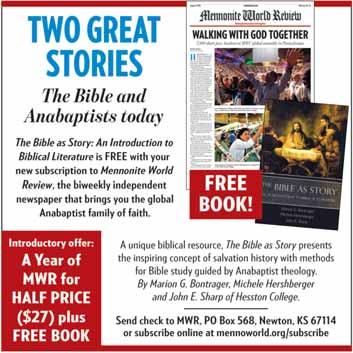
Director: Good Neighbor Ministries, a nonprofit ministry located in Omaha, Neb., is looking for a candidate to fill the role of director. Responsibilities include organizing work volunteers, managing service projects and building relationships with neighbors, community organizations and churches. Requirements include strong communication and interpersonal skills, some degree of handiness, vision of neighborhood renewal, working closely with the neighborhood church, Faith Bible Church, and relocating to provided housing in the Columbus Park neighborhood. Compensation includes housing, utilities and a monthly stipend of $1,500 with the freedom to raise personal mission support. Please send resume to stephen@goodneighbornetwork.net. For more information, call Stephen Stout at: (402) 616-1250
Program Director: Fresno Pacific University is seeking an associate program director in early childhood development. This faculty position is part of the School of Education. For a complete job description and requirements, please visit www.fresno.edu/careers.
Business Faculty: Fresno Pacific University is seeking a faculty member in business, with an emphasis in economics/finance. Professor reports to the dean of the School of Business for undergraduate level business programs. Must be able to work at FPU Main Campus as well as the Regional Campuses (Bakersfield, Merced, North Fresno and Visalia). Complete job description and requirements at www.fresno.edu/careers.
During the first few months of this year I had some health concerns, including a major surgery plus having my kidney invaded to remove two large kidney stones. I realize that there are people reading this who have dealt with a whole lot more than what I’ve been through. Not having experienced many health problems over the years, this all hit me suddenly and put a halt to much of what I normally do, including traveling to and fro.
Not having been in a hospital bed since I had my tonsils out in 1969, God got my attention. I couldn’t just get up and catch a plane for the next meeting held wherever. My meeting was with God. I had more time than usual to pray and just listen.
I also had more time to read the daily news, much of it about chaos all over the world including here in America. The list included the refugee crisis, famine, terrorism, hate toward Christians, America divided politically, reports about diseases that are now resistant to any antibiotics we have, North Korea firing missile tests, flag burnings, Israeli and Palestinian animosity and sin being glorified by Hollywood. It was a long, ugly list, and it could have been much longer.
Are we living in the final years or decades prior to Christ’s return? Only God knows. Many generations prior to ours believed they were living in the end times. But if we are living in the years close to his return, what must we be about? Do we draw back into a “church-shell” because it’s hard being a Christian in an atmosphere of animosity? Do we go about things as if nothing is changing around the
world and here in America—our heads in the proverbial sand? Do we ask our pastors to start preaching from Revelation almost every Sunday? What? What do we do? What does all the turmoil of a compromised world mean for us as Bible-believing Christians?
Lying in bed, asking God these questions, I’m not sure I heard any definitive answers. Except that the time is now to be the church in action. The time is now to reach more people with the gospel. The time is now to stop squabbling about little things and in unity attack the gates of hell!
In Revelation 7, I love the picture John paints of “a great multitude from every nation, tribe and people and language standing before the throne and in front of the Lamb.” Can you see that scene in your mind? It’s a sensational picture of what heaven will be.
But every time I read this passage I think: There will be a great multitude, but there can be more. We have time right now to join Jesus in what he is doing all over the world to make sure that there will be more. When I think of all the pieces that make up the Mennonite Brethren family I realize that God has blessed us with a lot of creative people—that we might have the mechanisms in place to have increasing impact together.
Put all the MB pieces together and God has a remarkable tool to use for his glory. A tool that can and must mean that the crowd standing before the throne of God will be larger than it would have been without us.◗

Don Morris began serving as the USMB national director Aug. 1, 2016. Prior to accepting this new position, Morris served as the USMB interim executive director for two years and as the director of Mission USA since 2004. He and his wife, Janna, live in Edmond, Okla., where they attend Cross Timbers Church.
